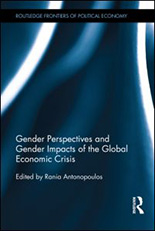
Research Topics
Publications on Developing economies
-
The BRICS Initiatives in the Current Global Conjuncture
Policy Note 2015/5 | August 2015An Assessment in the Context of the IMF Rulings for Greece
Developing countries, led by China and other BRICS members (Brazil, Russia, India, and South Africa), have been successfully organizing alternative sources of credit flows, aiming for financial stability, growth, and development. With their goals of avoiding International Monetary Fund loan conditionality and the dominance of the US dollar in global finance, these new BRICS-led institutions represent a much-needed renovation of the global financial architecture. The nascent institutions will provide an alternative to the prevailing Bretton Woods institutions, loans from which are usually laden with prescriptions for austerity—with often disastrous consequences for output and employment. We refer here to the most recent example in Europe, with Greece currently facing the diktat of the troika to accept austerity as a precondition for further financial assistance.
It is rather disappointing that Western financial institutions and the EU are in no mood to provide Greece with any options short of complying with these disciplinary measures. Limitations, such as the above, in the prevailing global financial architecture bring to the fore the need for new institutions as alternative sources of funds. The launch of financial institutions by the BRICS—when combined with the BRICS clearing arrangement in local currencies proposed in this policy note—may chart a course for achieving an improved global financial order. Avoiding the use of the dollar as a currency to settle payments would help mitigate the impact of exchange rate fluctuations on transactions within the BRICS. Moreover, using the proposed clearing account arrangement to settle trade imbalances would help in generating additional demand within the BRICS, which would have an overall expansionary impact on the world economy as a whole.
Download:Associated Programs:Author(s): -
Unions and Economic Performance in Developing Countries
Working Paper No. 787 | January 2014Case Studies from Latin America
This paper analyzes the economic impact of unions on productivity in the manufacturing sector across six Latin American countries: Argentina, Bolivia, Chile, Mexico, Panama, and Uruguay. Using an augmented Cobb-Douglas production function, the paper finds that unions have positive, but mostly small, effects on productivity, with the exception of Argentina, with a large negative effect, and Bolivia, with no effect. An analysis on profitability shows that, in most cases, the positive productivity effects barely offset higher union compensation, and that unions are negatively related to investment in capital and R & D. Different explanations for these effects are discussed.
Download:Associated Program:Author(s): -
Gender Perspectives and Gender Impacts of the Global Economic Crisis
Book Series, December 2013 | December 2013Edited by Rania Antonopoulos

With the full effects of the Great Recession still unfolding, this collection of essays analyzes the gendered economic impacts of the crisis. The volume, from an international set of contributors, argues that gender-differentiated economic roles and responsibilities within households and markets can potentially influence the ways in which men and women are affected in times of economic crisis.
Looking at the economy through a gender lens, the contributors investigate the antecedents and consequences of the ongoing crisis as well as the recovery policies adopted in selected countries. There are case studies devoted to Latin America, transition economies, China, India, South Africa, Turkey, and the United States. Topics examined include unemployment, the job-creation potential of fiscal expansion, the behavioral response of individuals whose households have experienced loss of income, social protection initiatives, food security and the environment, shedding of jobs in export-led sectors, and lessons learned thus far. From these timely contributions, students, scholars, and policymakers are certain to better understand the theoretical and empirical linkages between gender equality and macroeconomic policy in times of crisis.
Published by: Routledge
-
Expanding Social Protection in Developing Countries
Working Paper No. 757 | March 2013A Gender Perspective
This paper discusses social protection initiatives in the context of developing countries and explores the opportunities they present for promoting a gender-equality agenda and women’s empowerment. The paper begins with a brief introduction on the emergence of social protection (SP) and how it is linked to economic and social policy. Next, it reviews the context, concepts, and definitions relevant to SP policies and identifies gender-specific social and economic risks and corresponding SP instruments, drawing on country-level experiences. The thrust of the paper is to explore how SP instruments can help or hinder the process of altering rigid gendered roles, and offers a critical evaluation of SP interventions from the standpoint of women’s inclusion in economic life. Conditional cash transfers and employment guarantee programs are discussed in detail. An extensive annotated bibliography accompanies this paper as a resource for researchers and practitioners.
An extensive annotated bibliography accompanies this paper as a resource for researchers and practitioners.
Download:Associated Program:Author(s): -
The Global Crisis and the Implications for Developing Countries and the BRICs
Public Policy Brief No. 102, 2009 | August 2009Is the B Really Justified?
The term BRIC was first coined by Goldman Sachs and refers to the fast-growing developing economies of Brazil, Russia, India, and China–a class of middle-income emerging market economies of relatively large size that are capable of self-sustained expansion. Their combined economies could exceed the combined economies of today’s richest countries by 2050. However, there are concerns about how the current financial crisis will affect the BRICs, and Goldman has questioned whether Brazil should remain within this group.
Senior Scholar Jan Kregel reviews the implications of the global crisis for developing countries, based on the factors driving global trade. He concludes that there is unlikely to be a return to the extremely positive conditions underlying the recent sharp increase in growth and external accounts. The key for developing countries is to transform from export-led to domestic demand-led growth, says Kregel. From this viewpoint, Brazil seems much better placed than the other BRIC countries.
Download:Associated Program:Author(s):Jan Kregel
